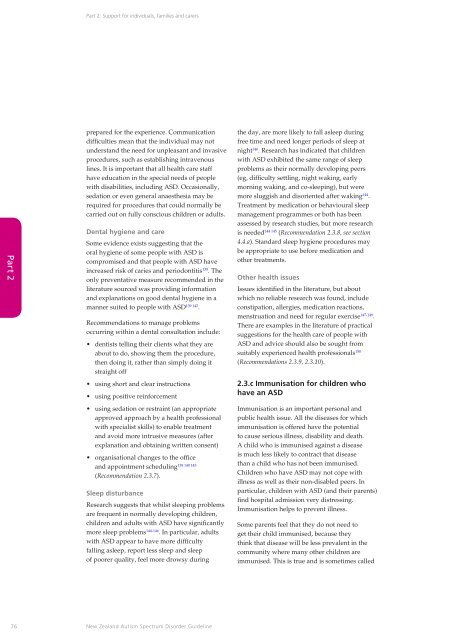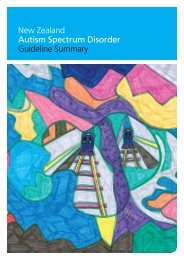New Zealand Autism Spectrum Disorder Guideline - Ministry of Health
New Zealand Autism Spectrum Disorder Guideline - Ministry of Health
New Zealand Autism Spectrum Disorder Guideline - Ministry of Health
Create successful ePaper yourself
Turn your PDF publications into a flip-book with our unique Google optimized e-Paper software.
Part 2: Support for individuals, families and carers<br />
Part 2<br />
prepared for the experience. Communication<br />
difficulties mean that the individual may not<br />
understand the need for unpleasant and invasive<br />
procedures, such as establishing intravenous<br />
lines. It is important that all health care staff<br />
have education in the special needs <strong>of</strong> people<br />
with disabilities, including ASD. Occasionally,<br />
sedation or even general anaesthesia may be<br />
required for procedures that could normally be<br />
carried out on fully conscious children or adults.<br />
Dental hygiene and care<br />
Some evidence exists suggesting that the<br />
oral hygiene <strong>of</strong> some people with ASD is<br />
compromised and that people with ASD have<br />
increased risk <strong>of</strong> caries and periodontitis 139 . The<br />
only preventative measure recommended in the<br />
literature sourced was providing information<br />
and explanations on good dental hygiene in a<br />
manner suited to people with ASD 139 142 .<br />
Recommendations to manage problems<br />
occurring within a dental consultation include:<br />
• dentists telling their clients what they are<br />
about to do, showing them the procedure,<br />
then doing it, rather than simply doing it<br />
straight <strong>of</strong>f<br />
• using short and clear instructions<br />
• using positive reinforcement<br />
• using sedation or restraint (an appropriate<br />
approved approach by a health pr<strong>of</strong>essional<br />
with specialist skills) to enable treatment<br />
and avoid more intrusive measures (after<br />
explanation and obtaining written consent)<br />
• organisational changes to the <strong>of</strong>fice<br />
139 140 143<br />
and appointment scheduling<br />
(Recommendation 2.3.7).<br />
Sleep disturbance<br />
Research suggests that whilst sleeping problems<br />
are frequent in normally developing children,<br />
children and adults with ASD have significantly<br />
more sleep problems 144-146 . In particular, adults<br />
with ASD appear to have more difficulty<br />
falling asleep, report less sleep and sleep<br />
<strong>of</strong> poorer quality, feel more drowsy during<br />
the day, are more likely to fall asleep during<br />
free time and need longer periods <strong>of</strong> sleep at<br />
night 146 . Research has indicated that children<br />
with ASD exhibited the same range <strong>of</strong> sleep<br />
problems as their normally developing peers<br />
(eg, difficulty settling, night waking, early<br />
morning waking, and co-sleeping), but were<br />
more sluggish and disoriented after waking 144 .<br />
Treatment by medication or behavioural sleep<br />
management programmes or both has been<br />
assessed by research studies, but more research<br />
is needed 144 145 (Recommendation 2.3.8, see section<br />
4.4.a). Standard sleep hygiene procedures may<br />
be appropriate to use before medication and<br />
other treatments.<br />
Other health issues<br />
Issues identified in the literature, but about<br />
which no reliable research was found, include<br />
constipation, allergies, medication reactions,<br />
menstruation and need for regular exercise 147-149 .<br />
There are examples in the literature <strong>of</strong> practical<br />
suggestions for the health care <strong>of</strong> people with<br />
ASD and advice should also be sought from<br />
suitably experienced health pr<strong>of</strong>essionals 150<br />
(Recommendations 2.3.9, 2.3.10).<br />
2.3.c Immunisation for children who<br />
have an ASD<br />
Immunisation is an important personal and<br />
public health issue. All the diseases for which<br />
immunisation is <strong>of</strong>fered have the potential<br />
to cause serious illness, disability and death.<br />
A child who is immunised against a disease<br />
is much less likely to contract that disease<br />
than a child who has not been immunised.<br />
Children who have ASD may not cope with<br />
illness as well as their non-disabled peers. In<br />
particular, children with ASD (and their parents)<br />
find hospital admission very distressing.<br />
Immunisation helps to prevent illness.<br />
Some parents feel that they do not need to<br />
get their child immunised, because they<br />
think that disease will be less prevalent in the<br />
community where many other children are<br />
immunised. This is true and is sometimes called<br />
76<br />
<strong>New</strong> <strong>Zealand</strong> <strong>Autism</strong> <strong>Spectrum</strong> <strong>Disorder</strong> <strong>Guideline</strong>











